#Mobile Public Library
Explore tagged Tumblr posts
Text

View of mural triptych on Man's Mobility by John S. Coppin located in Adam Strohm Hall at the Detroit Public Library. Printed on front: "Adam Strohm Hall, Detroit Public Library." Printed on back: "Detroit Public Library, Detroit, Michigan. Adam Strohm Hall. An exhibition center for the display of books and other cultural materials. This room of outstanding architectural beauty is enhanced by the mural triptych on Man's Mobility, designed and created by Detroit artist John S. Coppin. Photo by John Penrod. [copyright] Penrod/Hiawatha Co., Berrien Center, Michigan 49102, phone 616-461-6993."
Burton Historical Collection, Detroit Public Library
#john s. coppin#art#murals#library#john penrod#detroit#man's mobility#adam strohm hall#libraries#library buildings#postcards#triptych#detroit public library
62 notes
·
View notes
Text
saw a post the other day full of people complaining about helping older people use computers, about how clueless they can be, how frustrating it is to have to tell them basics like where to click, exactly what to type, how some people just never seem to get it. then an addition was someone who works in a library sharing a story of a ninety-something woman who picked it up instantly. it’s not difficult, this elderly woman said! wow heartwarming.
i’m here to say that plenty of older and disabled and otherwise marginalised people do not know how to use computers and in some cases will find it very difficult if not impossible to learn to use them. for many people it is difficult. it can be insurmountable. we should be fighting for a world where vulnerable people who are not computer literate can use computers with assistance when they want to, but where they do not need to use computers, ever. this is a serious access issue as so much government paperwork is moving to being online only. your frustration at working a job that likely overworks and underpays you to help people use these computers - please think before turning it on the disenfranchised and vulnerable people who rely on you for assistance and resources.
it’s an annoyance for you? then think about why is it that governments habitually move the resources that vulnerable people need to live to online-only when they know as well as you and i do that the digital divide is real. think about how intentionally difficult governments and agencies make it to access forms and paperwork and everything else that is needed to claim such a small amount of money as people currently get when they are out of work and trying to claim benefits, or on allowances for refugees, etc. how much are governments dedicated to taking away people’s dignity and autonomy by swapping to a system that millions of people do not have access to without going into a public library and asking for help, if there’s even anyone there who is able to or allowed to help? i can get people set up with email and find websites for them but im not even allowed to help with sensitive forms - i can only do what i can, you know. i wish it was more.
before i started this job i thought of myself as impatient. i’m not going to tell you any stories in detail because my library patrons didn’t consent to being A Teaching Moment. but i have requests from “difficult” patrons every day. i take a deep breath and if i don’t have a queue, i try to help. i smile and say “don’t worry” when someone is apologising over and over because they were never taught this and they are stressed out and it doesn’t make sense to them. not everyone grew up with neopets and Hotmail. it makes you no better than them if you did.
i’m not perfect but i’m trying. just… think about it, next time you roll your eyes because another old lady doesn’t know how to use gmail, even though you’ve already shown her what to click. ask if your library has thought about seeing up dedicated sessions for helping people use computers if they need assistance (maybe it’ll take some of the work away from you and give you more breathing space). make leaflets telling people where they can go nearby for help with computers - maybe some local charities or non-profits have drop-in sessions. join campaigns for easier access, for letting people who can’t use computers do what they need to without needing to find some way to get online. all of these are more useful in holding solidarity than in just being frustrated that another person in their seventies, eighties, nineties, struggles to use a computer.
a couple more notes of things that i think about a lot when it comes to computer access at the library that might not occur to people who don’t routinely help people out with basic computer stuff:
2-factor authentication is the devil. i understand the intention behind it and cyber security is important and difficult! but 2-factor authentication in practice locks out and disenfranchises vulnerable people every day, makes them unable to access their emails and everything else on the web that depends on their email, makes them unable to access their data and government portals, and makes them even more vulnerable than governments already conspire to make them. plenty of people just do not understand how 2FA works. it doesn’t matter how many times the google website says : look at your phone and click on this number. or whatever. if somebody else is not there to tell them what to do — if they haven’t recently had to change their phone number, as many vulnerable people might have had to do — they will not be able to do it.
google have recently been selling chromeboxes to public libraries (and schools) cheap. chromeboxes in public libraries are also the devil. on a windows PC loaded with word, lots of people are happy and able to do what they need to do. the problem comes when they have to log in to a google account just to access a fucking word processor. it’s a scandal how many people are locked out of access to something as simple as a word processor unless they have a google or Microsoft account. we are talking people who don’t want email accounts, who just want to type up a letter to send in the post. Every time I ask online for a good alternative I get something extremely tech-y or like fucking online textpad. we just need a good accessible word clone that runs in a web browser like Word XP. It would make a lot much easier. And yet!
144 notes
·
View notes
Text
Elevators that have to be escorted by staff are extremely irritating
That's not accessible if I have to try to track down somebody just to unlock the door for it
#disability#chronic pain#fibromyalgia#mobility aid#cane user#this is a public library too not even a private building#I gave up and used the stairs but not everyone has that option
19 notes
·
View notes
Text
i will support public libraries when the ALA terminates their stupid Bill of Rights
#until then I will not lift a finger to help defend or preserve public libraries#I will direct my attention to private libraries#mobile#x#respublica
12 notes
·
View notes
Text
hashtag depressed about the library again. i really love my job and my branch and the people i work with. even if i don’t get laid off i’ll probably get moved and put in a different position and i won’t get to do programming. this is all so fucked
#just#i am literally doing all i can#i am literally helping to mobilize the public#the [redacted] is [redacted] [redacted]#i don’t have faith in library admin or the board#and i don’t want to be moved to a different branch#and i really REALLY don’t want to and like. CANNOT get laid off right now#i don’t make enough to live as it is (with medical bills)#just.#fuck dude.
3 notes
·
View notes
Text
well i finally (technically) got wifi in my apartment!
#shhh sharkie#i’ve been just using my mobile hotspot or going to the library or work for internet things#it’s mostly been forgetting to do it rather than a reluctance or financial strain yknow?#tho looking at how this bill is going to evolve once the initial deal is up…we’re gonna have to finangle some shit#I still need a router and such but the like ‘public’ xfinity wifi is available so now i can actually connect#idk id just been putting it off. all of my other utilities are covered within rent besides internet so it hasn’t been super pressing#but i don’t want to keep eating through my phone data just to download episodes and movies to watch offline#or eating through it during telehealth appointments#lord knows it makes my phone a furnace for my weekly hour-long therapy appointment
3 notes
·
View notes
Text
Public libraries are institutions that offer free access to books, other media, and information services to the general public. This idea is rooted in the belief that knowledge, education, and the pursuit of personal growth should not be restricted by one's financial situation.
Libraries have played a crucial role in promoting literacy, lifelong learning, and social equality by making books and other educational resources accessible to everyone. They are places of community gathering and provide a space for people to engage in intellectual and cultural activities.
Libraries also help bridge the digital divide by providing computer and internet access to those who cannot afford it. In short, public libraries are vital community resources that play an important role in democratizing knowledge and promoting social and economic mobility.

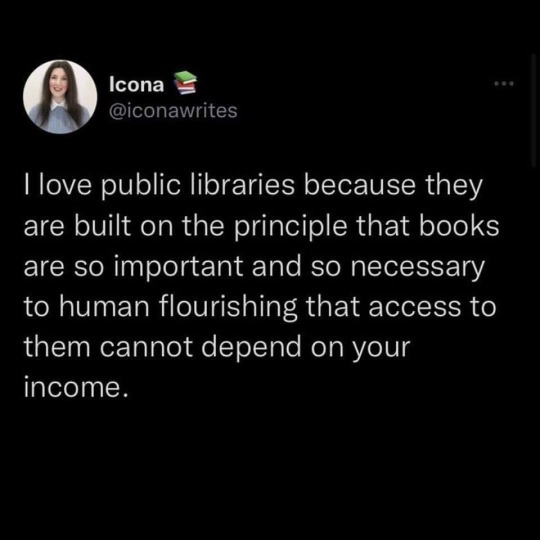
#public libraries#democratizing knowledge#social mobility#books#information#low-income communities#literacy#lifelong learning#digital divide#internet access#community resource#student#job-seeker#islam#arabic#malaysia#singapore
52K notes
·
View notes
Text

0 notes
Text
Today (July 19th) is Changing Places awareness day!
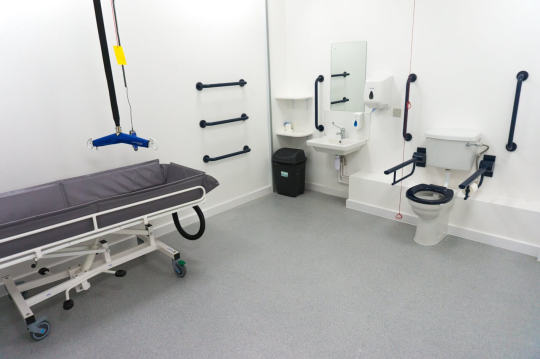
[Image description: a photo of the changing places toilet with the features listed below /end ID]
What is a changing places toilet?
A changing places toilet is a toilet which can be used by disabled people like me who can’t use a standard accessible toilet. This may be because someone needs extra equipment, and/or room for carers to help them. The main features of the changing places toilet are:
Lots of room! Changing places toilet must be at least 12 square metres. This means that there is plenty of room for a wheelchair user to turn around as well as room for up to 2 carers.
A peninsular toilet! This is a toilet which has enough room on each side were wheelchair to be positioned for transferring. As with standard accessible toilet there are grab rails on each side.
Accessible washbasin! The washbasin must have room underneath for a wheelchair user. An adjustable height washbasin is preferred.
A ceiling hoist! This allows people who cannot transfer independently to be able to safely get out of their wheelchair. A person brings their own sling which is hooked onto the hoist allowing them to be lifted.
An adult size changing table! This allows people need help with undressing to use the toilet, or help changing incontinence pads to have their needs met safely and with dignity. Without a changing table, many people have to resort to lying on the toilet floor to change their pads which is unsafe, undignified and unhygienic.
Why raise awareness?
The lack of changing places toilet means it’s hard for disabled people like me to leave the house. It’s limits our ability to socialise, access work/education, exercise, travel, and even attend hospital appointments. (In the UK there are only 93 hospitals with a registered changing places toilet).
I have to plan my entire life around the few changing places toilet that exist, which massively shrinks my world. It’s incredibly difficult for me to travel (less than 2% of train stations in the UK have a changing places toilet), go days out, visit the hospital, and otherwise experience the world outside my house. Hopefully one day every event like Pride or music festivals will have a mobile changing places toilet, and there will be public changing places toilet with 24/7 access in every town, as well as changing places toilets in public buildings like leisure centres, libraries, museums, cinemas, tourist attractions and shopping centres.
More info including what you can do to help the UK campaigns for more changing places toilets can be found at changing-places.org
9K notes
·
View notes
Text
poverty is so isolating. it means being alone and away from people, events, society. you can't afford trips to and from places. you can't afford to spare gas. you can't afford the entrance fee. you can't afford tickets. you can't afford making eating a social event. you can't buy drinks. you can't engage in hobbies.
all you're encouraged to do are "free" things, but they're not free. Internet isn't free. cell phone service isn't free. sitting on the computer and your phone all day is frowned upon for good reason because it destroys your health. we shouldn't have to only be able to talk to people digitally to be able to socialize. we shouldn't have to watch streams all day. we need to see other people, i DON'T care if it costs a few dollars: poor people shouldn't be relegated to what few free activities there are because most of them involve being alone.
the library is one of the most annoying suggestions because it makes you feel pinned. yes i want to support my local library. i cannot sit still and read in public. it is not socially acceptable to start taking to strangers in the library in fact you can't have conversations there at all because you need to be quiet for the other readers. libraries are places of education, accessibility to information and resources, and social services. it is not a place to socialize. maybe entertain but Only if you can, well, read. i have dissociative disorders and unmedicated ADHD, i don't make it very far into books. i feel like most poor people get really tired of the library suggestion. it's an amazing resource. but it's not for this purpose
social events are almost always off limits. sure you can go to the bar and not drink, if you don't have alcohol trauma, aren't a recovering alcoholic, aren't overstimulated by noise, aren't photosensitive, don't have anxiety with crowds and strangers, aren't a minor, have an ID, and can walk there or get a ride there. sure you can walk to the cafe and use their Wi-Fi but this isn't a social activity and in many places you can't sit there for long periods unless you buy anything.
i get SO tired of the "go to a cafe" suggestion. think about how boring that actually is. you're alone. in America, it is NOT socially acceptable to sit at a strangers table like it is in other countries, let alone just start talking to them. it is NOT a common experience to strike up a conversation with strangers in cafes in America, like we really have cafes other than fucking starbucks to begin with.
going for walks and going to parks is not accessible to people with physical disabilities, agoraphobia, some schizophrenics, people with dog trauma, and other issues. parks usually have really poorly maintained or no sidewalks or foot paths. they can be uneven and hard to traverse for people who use mobility aids. unless you live near a monument or state park, your local parks are really meant for dogs to piss and shit in, for joggers to run through, and to look impressive to investors. they're usually pathetic swaths of grass with you guessed it, nothing to do. again it's rare to strike up conversation at the park. people need conversation starters. there's Nothing going on at the park. it's a great place to go if you need to cool down when angry or stressed, but it's fucking boring.
window shopping is pointless and dehumanizing. i really can't stand it when people suggest poor people window shop so we can think about things to buy when we have money ... why the fuck would i ever do that. when i don't have money i don't think about frivolous things i don't need. what the fuck kind of activity is window shopping, that's for people who have money.
poor people get tired of doing the "free" shit. if you suggest that a poor person should do these things when you do none of them yourself, you have 0 clue how boring and dehumanizing it is to never be able to decide what you do with your time. to have limited options to live. to experience.
money is not the reason you get to experience; you get to experience because you are alive. no poor people don't deserve to sit there and do nothing all day because they didn't "earn" anything. no poor people don't deserve to live their lives because they don't make as much as you. poor people deserve to enjoy being alive. poor people get to decide to have fun with their money, too.
I'm so tired of people being so harsh on people who struggle with financial issues and spending money "right" or "smart". reckless spending and difficulty managing finances are symptoms of mental illness and neurodivergence. bipolar, personality disorders, schizophrenia, anxiety, autism, ADHD, OCD and other mental health conditions can make managing funds very hard. don't be extra cruel to someone who spends money poorly in response to a mental health crisis. this won't make their situation any easier.
i sat in apartment after apartment for a decade doing nothing. i was a total shut in because i had no money. i never did anything but browse the Internet. all day long. without end. i was dissociating constantly. my anxiety was at its highest. i was constantly psychotic. instead of going out to fix it, i would stay inside longer, making it worse and worse and worse. i never bought anything. i didn't have hobbies. all of my decorations and possessions were from my childhood, my clothes were literally falling apart, a decade old. my walls were barren. my world was grey.
don't do this to yourself. don't tell yourself that you deserve nothing because it's harder for you to make money than other people. I'm very lucky now that i have made friends who pulled me out of my shell and have helped me get outside of my house. i spent so long alone and trapped indoors thinking it's the only thing i could do with myself for years. I'm finally recovering. if you're poor you deserve to live. you're alive. and you're not alone. i love you.
#punk#trans punks#trans punk#punx#trans punx#queer punks#queer punx#queer punk#poverty#anticapitalist#anticapitalism#our writing
1K notes
·
View notes
Text

Detroit Public Library
38 notes
·
View notes
Text
whether the internet becomes an intolerable surveillance state, ubiquitous subscription model, or unusably ad- or AI-ridden shithole, I think we need to remember
how to do things offline
either on your personal hard drive (just because it’s an app doesn’t mean the information is stored in your device) or on paper. I’m not saying the collapse of the internet is imminent, and I’m not suggesting we do everything completely without technology, or even stop using it until we have to. (to be clear, I also don’t think the internet will just blink out of existence, suddenly stop being a thing at all; rather I think it might continue to lose its usefulness to the point where it’s impossible to get anything done. anyway) but some people may have forgotten how we got by before the internet (I almost have!), and the younger generation might not have experienced it at all.
I figure most people probably use the internet mainly for communication with friends and family, entertainment and creation (eg. writing), and looking up how to do things, so here’s how to do those things offline:
First and most importantly, download everything important to you onto at least one hard drive and at least one flashdrive! files can get corrupted and hardware can get damaged or lost, but as long as you keep backup copies, you have much-closer-to-guaranteed access versus hoping a business doesn’t decide to paywall, purge, or otherwise revoke your access. I would recommend getting irreplaceable photos printed as well
download and/or print/write down:
anything important to you - photos/videos, journals, certificates, college transcripts
contact info - phone numbers and/or addresses of friends/family (know how to contact them if you can’t use your favourite messaging app), doctors (open hours would be good too), veterinarians if you have pets, and work
how-to’s - recipes (one, two), emergency preparedness (what do I do if… eg. I smell gas)
other things you might google: cleaning chemicals to NOT mix, what laundry tag symbols mean, people food dogs and cats can and can’t eat, plant toxicity to pets
and know offline ways to find things out - local radio station, newspaper, a nearby highway rest area might have a region map, public libraries usually have a bunch of resources
also, those of you who get periods should strongly consider not using period tracking apps! here’s how to track your period manually
free printable period tracker templates (no printer? public libraries usually charge a few cents per page, or you can recreate it by hand)
moving on to entertainment, you can still get most media for free! it’s completely legal to download your favourite movies to your own personal hard drive, you just can’t sell or distribute copies (not legal advice)
movies: wcostream.tv (right click the player) - the url changes every once in a while but usually redirects; I recently noticed that it’s hiding a lot of movies behind “premium,” so it may or may not work anymore | download youtube videos
music: how to get music without streaming it | legal free downloads
games: steamunlocked.net - doesn’t have every game and can be slow to update, but very reliable
books: free online libraries | legal free downloads
otherwise passing time:
active outdoor games
for road trips (social verbal games)
for when power’s out
for sheltering in place (not all offline, but good ideas)
board games (often found at thrift stores)
ad-free customisable games collection (mobile)
read, write, draw, or whatever your craft is, sing, dance, clean, reorganise, take a bath
go outside - excuses include napping (if safe), eating, reading, finding cool plants/animals/rocks, playing with the dog
places to go include:
zoos and museums can be surprisingly cheap
parks and nature preserves
library, mall, or game shop
and a few miscellaneous things for good measure:
time budgeting | household management
how to use a planner | I’ve had success with visually blocked-out schedules like these
please add on if you have any other offline alternatives to common uses of the internet!
571 notes
·
View notes
Text
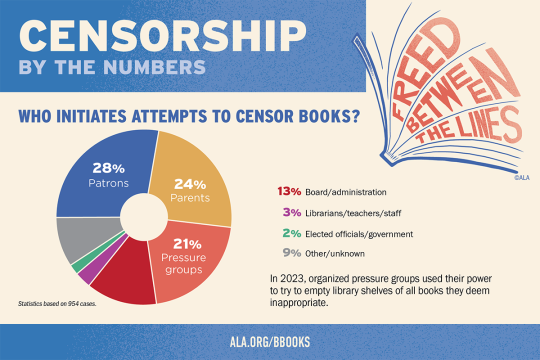


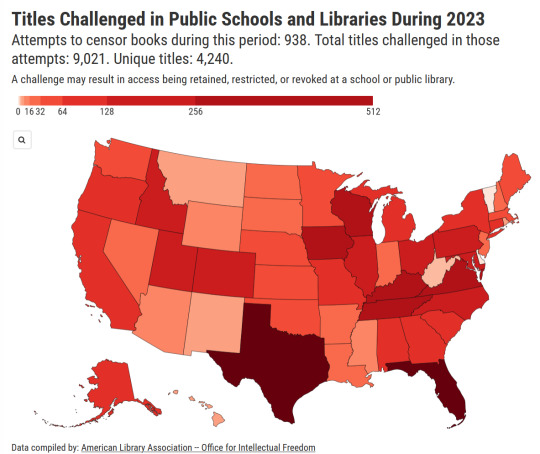
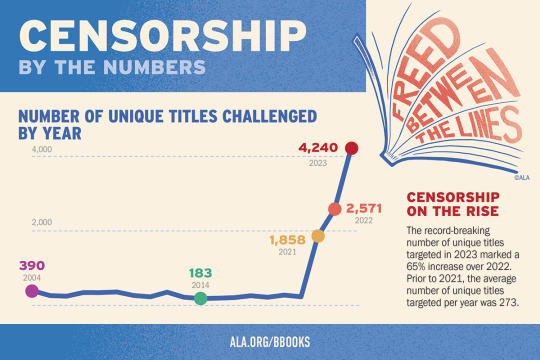
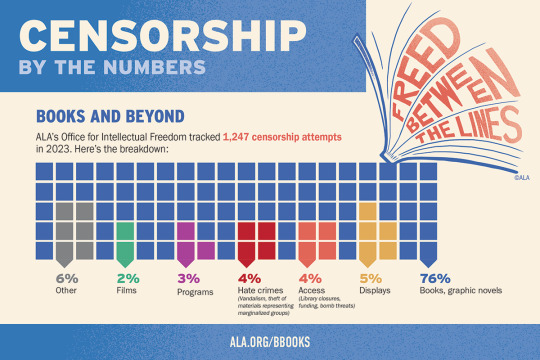
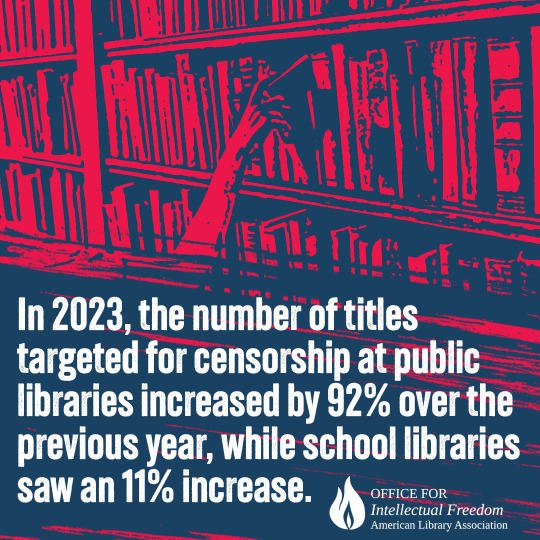
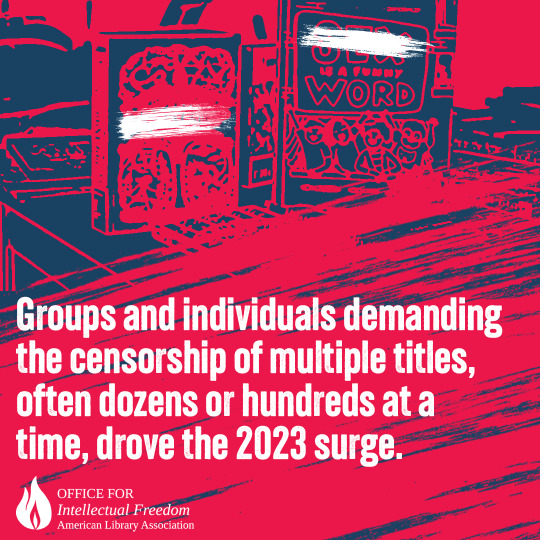
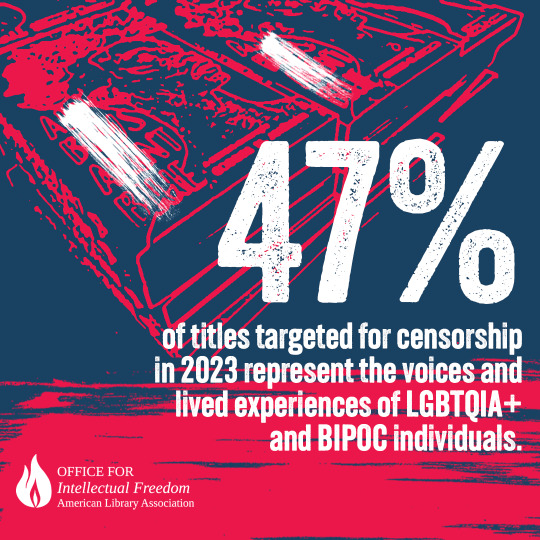
The ALA's State of America's Libraries Report for 2024 is out now.
2023 had the highest number of challenged book titles ever documented by the ALA.
You can view the full PDF of the report here. Book ban/challenge data broken down by state can be found here.
If you can, try to keep an eye on your local libraries, especially school and public libraries. If book/program challenges or attacks on library staff are happening in your area, make your voice heard -- show up at school board meetings, county commissioner meetings, town halls, etc. Counterprotest. Write messages of support on social media or in your local papers. Show support for staff in-person. Tell others about the value of libraries.
Get a library card if you haven't yet -- if you're not a regular user, chances are you might not know what all your library offers. I'm talking video games, makerspaces (3D printers, digital art software, recording equipment, VR, etc.), streaming services, meeting spaces, free demonstrations and programs (often with any necessary materials provided at no cost!), mobile WiFi hotspots, Library of Things collections, database subscriptions, genealogy resources, and so on. A lot of electronic resources like ebooks, databases, and streaming services you can access off-site as long as you have a (again: free!!!) library card. There may even be services like homebound delivery for people who can't physically come to the library.
Also try to stay up to date on pending legislation in your state -- right now there's a ton of proposed legislation that will harm libraries, but there are also bills that aim to protect libraries, librarians, teachers, and intellectual freedom. It's just as important to let your representatives know that you support pro-library/anti-censorship legislation as it is to let them know that you oppose anti-library/pro-censorship legislation.
Unfortunately, someone being a library user or seeing value in the work that libraries do does not guarantee that they will support libraries at the ballot. One of the biggest predictors for whether libraries stay funded is not the quantity or quality of the services, programs, and materials it offers, but voter support. Make sure your representatives and local politicians know your stance and that their actions toward libraries will affect your vote.
Here are some resources for staying updated:
If you're interested in library advocacy and staying up to date with the challenges libraries are facing in the U.S., check out EveryLibrary, which focuses on building voter support for libraries.
Book Riot has regular articles on censorship attempts taking place throughout the nation, which can be found here, as well as a Literary Activism Newsletter.
The American Library Association's Office for Intellectual Freedom focuses on the intellectual freedom component of the Library Bill of Rights, tracks censorship attempts throughout each year, and provides training, support, and education about intellectual freedom to library staff and the public.
The Electronic Frontier Foundation focuses on intellectual freedom in the digital world, including fighting online censorship and illegal surveillance.
I know this post is long, but please spread the word. Libraries need your support now more than ever.
153 notes
·
View notes
Text
i feel like vaguely talking about building community is not helpful at all but like concrete steps on how to do that. im not american and neither do have any significant following so i expect my contribution to be not helpful.
choose one cause, like. feminism, environment, anti-racism, idk. look up organisations or groups that work for that cause, like my body my choice, fridays for future, extinction rebellion, food not bombs, pantifa, free palestine, etc etc, see if they have a local chapter in your city or a city near you, mail them, go to their meetings. if theres nothing, get creative with google, facebook and insta and search for independent local groups. queer centres, refugee help centres, squats. these sort of depend on social media presence so you should be able to find something after a while. mail or dm them, show up to their events and meet ups. check black boards at community centers, at schools and universitys, librarys etc. get AGGRESSIVELY involved. turn your anger into action. you only need like 3 people, design freeware, a room to meet (can literally be your own living/bed room, or fucking zoom) and a little bit of local clout (see above) and you can mobilize people to do protests, readings, info tables or other types of actions. be persistent. do not allow yourself and your new comrades to get tired. consistently do something for key days, like international womens day, trans day of remembrence, or something. after two or three years, your community will have grown, you will notice that you in fact make a difference. there are people depending on you and you are depending on these people. even if you are socially awkward i promise
edit: if there is nothing in your city: start it yourself. grab a friend. create a facebook and insta page, make a post what your group is about and then. plan your first meetup. start with casual shit. monthly feminist brunch at the local cafe. monthly queer chat at the library. aggressively advertise. properly tag your city and your causes. do not be afraid to put up flyers/posters in public that you print at home. i am sure after a while someone will show up. involve them.
56 notes
·
View notes
Text
Let's dream. These are the things i think should be provided to the public for free
Food Centers:
it's not fancy and there's not a high variety, heck it's basically just rice, beans, some fruit juice, and the vegetable of the month, but you can go to any food center and get, for free, the baseline nutrition you need for staying alive and healthy. This food is available, for free, in any amount, in both raw and cooked forms, as Food Centers are both storage and cooking facilities. Some diet alternatives are made available for those with, for example, allergies or food related mental issues, tho this may require registering with whatever Food Center you plan on visiting ahead of time. And of course baby formula, baby food, and clean water.
Public Hospitals:
And yes this includes ALL medical treatments physical or mental. Any person, at any time, for any reason, can walk into a Public Hospital and receive the best medical care available. No paperwork (i mean they do keep your medical records on file etc but there is no paperwork for the patient to fill out). No hoops, no proving anything, no barriers to entry, nothing -- you enter a hospital, you receive medical care, period. Medical transport and mobile medical staff available as needed. Unlike with food, there is no "free tier" because anything less than the best medical treatment available is a crime against humanity. Possibly publicly available bathing facilities attached.
Public Housing:
Government built apartment complexes, first come first served, if it's empty you can move in. All you have to do is register, so that you don't go on a trip and have people move in because the place seemed empty. Probably some regulations like you can't register for more than one permanent residence, maximum of bedrooms equal to the number of people registered plus one, but you can have a temporary second apartment on a weekly basis, subject to availability - so like, you can go on a trip for a week, and then extend the trip by a week, and then maybe you want to extend a third week and you get told sorry there are now people waiting for a permanent residence in this area, temp residence at this location is no longer available until new housing units are completed. Something like that.
Information.
This is basically free school (through college) but i call it Information because I believe internet access and libraries, and press/public broadcasting also belong on this list
Clothing:
It isn't high fashion, it might be little more than socks, shoes, blankets, and government issued jumpsuits in hot and cold weather variants, but nobody is going to be left without clothing if they need it. Probably a small distribution center attached to each Food Center. People often forget about this one, but it's important.
Public Transportation:
what it says on the tin. Comprehensive, networked, including something like a (free) taxi program attached to train depots servicing rural areas that lack infrastructure or population density for even busses (so like, there might not be a train station in Lewistown Montana, but you can still get transported to Billings and catch a train)
BUT HOW WILL WE PROVIDE / PAY FOR THESE THINGS?
glad you asked
first of all there will still be taxes, because there will still be jobs, because almost nobody is going to want to wear the government issued jumpsuits and eat nothing but rice and beans. These things will keep you alive and healthy, but almost everyone is going to want their favorite foods and to be dressed fashionably, etc etc etc. You'll have hobbies you want to pay for, you'll have special dates you want to go on, people will want to live in their dream home... humanity is going to WANT THINGS, and so there will still be work and pay and money and taxes. There will even still be rich people and poor people if economic ladders are your kink, it's just now nobody will ever die of being poor. And if this is what we're getting, i do not care if the taxes are at like 65%, as long as the wealthy and the corporations are paying it too, but let's try to get it done for 50% for easy math. And we don't have to do all that complicated shit about this person should only pay less than that because they are poor or whatever, because a person could have zero money and still be basically ok. Just. 50% across the board.
BUT ALSO. We have resources. Do you know who owns all the offshore oil? Do you know who owns all the national forests that get logged for wood? We do. It's pubic property that our government leases to private companies to sell us back our own stuff. So maybe we should handle our resources differently.
AND. Labor. I've written about this before, but, i say instead of the unending argument about military spending, we increase the military budget, but we use them as a public work force here at home. Only about 10% of the US military is combat personnel. The other 90ish percent have jobs like Forklift Operator, Computer Engineer, Doctor, Mechanic, etc. So let them have some more funding, and let's get them building our government housing and staffing our Food Centers etc.
And sure, it probably wouldn't work perfectly, it would need constant management and innovation to continue to function. But it's not like our current system is working very well, right? Current system sucks so much that in Chicago alone every year senior citizens die because they have to choose between freezing or paying for their medicine. So we don't really have anything to lose. I mean most of us don't anyway. Might take some pitchforks and torches to convince the corporate oligarchy, the political puppets and their billionaire puppeteers.
oh, and

60 notes
·
View notes
Note
After seeing your weatherbugapp reblog i installed duckduckgo and tried it.

I don't know much about technology tbh but i downloaded this app less than 30 mins ago and in that time google tried to track me 112 times?? And they tried to collect finger prints? And my first and last name? And my gender? And my country, state and city? My gps coordinates? My postal code? My network carrier? My fricking battery level for whatever reason? Can you please tell me if this is normal at all, because i'm freaking out right now. I just turned 18 and started using mobile banking and stuff and this shit scares me
Why tf does it need to know my screen density???my system volume????my charging status????? What tf are they cooking
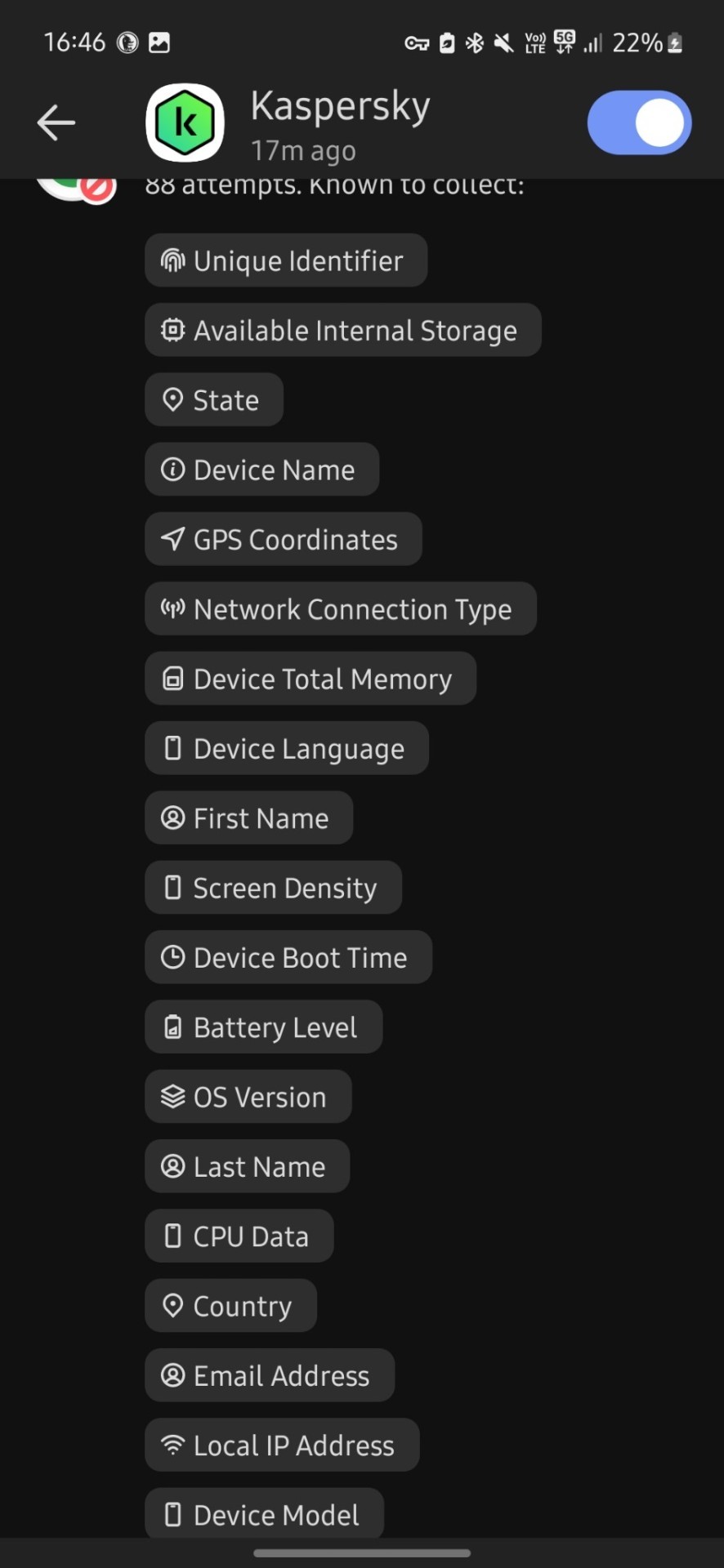
Now it's at 476 tracking attempts bro???? barely 5 mins passed.....
I condensed your three asks into one for readability!
And yeah, I'm very far from an expert about any of this, but as far as I know that's just. Normal. That's the normal amount of spying they're doing on your phone. I assume the numbers we see are to some extent because having been foiled, a lot of these scripts try repeatedly, since I can't imagine what use thousands of trackers per phone would be even to the great aggregators.
Tracking the phone stuff like screen resolution and battery level is because (apart from that definitely not being considered remotely 'private' so it's Free Real Estate) in aggregate that data can be used to track what phone use patterns are like on a demographic scale and therefore. Where the smart money is.
Almost all of this is getting sold in bulk for ad targeting and market analysis. This does presumably make it very hard to notice when like. Actually important stuff is being spied on, which is why I feel better about Having Apps with the duckduckgo app blocker thing.
My bank's app reportedly sells data to a couple aggregators including Google. Not like, my banking info, but it's still so offensive on principle that I avoid using the app unless I have to, and force stop it afterward.
The patterns that show up on the weekly duckduckgo blocker report are interesting. Hoopla attempts about two orders of magnitude more tracking than Libby, which makes sense because they're a commercial streaming service libraries pay by the unit for access, while Libby is a content management software run by a corporation that values its certification as a 'B' company--that is, one invested in the public good that can be trusted. The cleanness of their brand is a great deal of its value, so they have to care about their image and be a little more scrupulous.
Which doesn't mean not being a little bit spyware, because everything is spyware now. Something else I've noticed is that in terms of free game apps, the polished professional stuff is now much more invasive than the random kinda janky thing someone just threw together.
Back in the day you tended to expect the opposite, because spyware was a marginal shifty profit-margin with too narrow a revenue stream to be worth more to an established brand than their reputation, but now that everyone does it there's not a lot of reputation cost and refraining would be sacrificing a potential revenue stream, which is Irresponsible Conduct for a corporation.
While meanwhile 'developing a free game app to put on the game store' is something a person can do for free with the hardware they already have for home use, as a hobby or practice or to put on their coding resume. So while such apps absolutely can be malicious and more dangerous when they are than The Big Brand, they can also be neutral in a way commercial stuff no longer is. Wild world.
But yeah for the most part as far as I can make out, these are just The Commercial Panopticon, operating as intended. It's gross but it probably doesn't indicate anything dangerous on an individual level.
54 notes
·
View notes